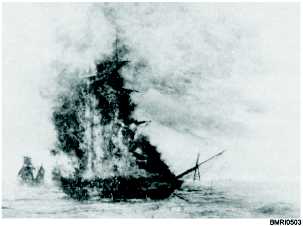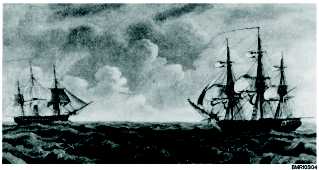Quasi War
The “Quasi War” with France, 1798 - 1801, was
entirely a naval war. It followed worsening diplomatic
relations with France, including a refusal by the French
Secretary of Foreign Affairs to receive U.S.
representatives unless a bribe was paid and a loan
granted. The famous expression “Millions for defense,
but not one cent for tribute” originated at this time. The
Quasi War was the baptism of fire for the United States
Navy under the new Constitution.
Barbary States War
The U.S. Navy was sent to the Mediterranean to
deal with the Barbary States, who were forcing other
nations to pay ransom for safe passage through the
Mediterranean Sea. During the campaign, Lieutenant
Stephen Decatur and 84 seamen slipped into the harbor
at Tripoli on February 16, 1804, and burned the captured
frigate USS Philadelphia (fig. 5-3). Not a single
American Sailor was lost. Britain’s Admiral Lord
Nelson described the raid as “one of the most bold and
daring acts of the age.”
THE WAR OF 1812
The War of 1812 was brought on, in part, because
the British were impressing (forcing Americans to serve
in the British Navy) American seamen. England
impressed American seamen to make its presence felt
and demonstrate its power on the American continent.
On August 19, 1812, Captain Isaac Hull aboard the
USS Constitution defeated the British frigate Guerriere
(fig. 5-4), and the USS Constitution earned its nickname
“Old Ironsides.” The victory convinced Congress and
President Madison that a stronger Navy was needed to
win the war and protect the country.
Almost a year after Hull’s important victory,
another famous event in our naval history occurred. On
September 10, 1813, Captain Oliver Hazard Perry
defeated a British squadron on Lake Erie and wrote his
dispatch, “We have met the enemy and they are ours.”
Perry’s win cut British supply lines on the Great Lakes,
gained control of Lake Erie, and strengthened the
American claim to the Northwest Territory.
The Barbary States War and the War of 1812 saw
bigger ships coming into the Navy. Typical was our first
ship-of-the-line, the USS Independence, followed by
the 74-gun USS North Carolina.
THE YEARS FROM 1813 TO 1815
Following the War of 1812, our Navy underwent
technological changes. Before the Civil War, new
scientific advances foreshadowed the incredible
technologicalrevolutionthatcontinuesintotoday’sworld.
One change was the use of steam. The Navy entered
a new era, an era of the “steam-driven warship.”
Harnessing the power of steam was the most important
development in the surface Navy during the first half of
the 19th century. Steam began to replace wind as a
means of propulsion. It promised to eliminate some of
the hazards and delays caused by ships being blown off
course or left dead in the water.
5-6
Student Notes:
Figure 5-3.—Lieutenant Stephen Decatur and 84 seamen
slipped into Tripoli harbor and burned the captured
American frigate USS Philadelphia.
Figure 5-4.—During the War of 1812, Captain Isaac Hull,
aboard the USS Constitution, defeated the British
frigate Guerriere.




